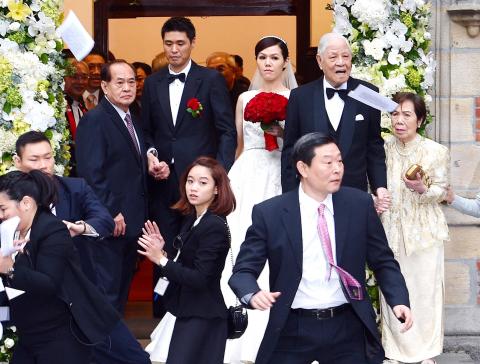Lee Kun-yi (李坤儀), a granddaughter of former president Lee Teng-hui (李登輝), married James Chao (趙贊凱) yesterday.
The groom, who is president of model management company Catwalk Production House Corp’s Hong Kong branch, arrived at the former president’s residence in Taipei to pick up the bride, according to traditional Taiwanese wedding custom.
The couple then held a Christian ceremony at Taipei’s Jinan Presbyterian Church, at which the former president walked his granddaughter down the aisle and handed her over to Chao.

Photo: Lo Pei-der, Taipei Times
Lee Kun-yi is the daughter of the former president’s eldest son, Lee Hsien-wen (李憲文), who died of sinus cancer in 1982.
The 92-year-old Lee Teng-hui said he was happy that his granddaughter has gotten married, adding that although he is reluctant to part with her, he has to let go and allow her to build her own family.
He also said he hopes to have great-grandchildren soon.
The day was marred by a protester who allegedly threw a pile of paper at the former president while he was having his photograph taken with the newlyweds after the ceremony at the entrance of the church.
The protester, later identified as pro-unification activist Yang Szu-sheng (楊思聖), was heard loudly accusing the former president of promoting “Taiwanese independence” and shouting: “Long live the Republic of China.”
The paper missed the former president and security personnel quickly put a quick end to the disturbance.
Lee Teng-hui’s response to the disturbance was noteworthy. Though the event was not the first time the former president has been confronted by protesters, moments after he left in his car, he asked his bodyguard to fetch a copy of Yang’s protest material, apparently having taken an interest in the demands.
He was quoted as saying that he would read Yang’s demands closely, adding that he believed the protester “is mistaken in his thinking.”
Lee Teng-hui’s office director Wang Yan-chun (王燕軍) said that the former president was not angry about the matter, but felt slight regret.
Wang added that the event’s security “needed improvement.”
The couple were to hold a wedding banquet at the Mandarin Oriental Taipei hotel yesterday evening.

Chinese Nationalist Party (KMT) Chairman Eric Chu (朱立倫), spokeswoman Yang Chih-yu (楊智伃) and Legislator Hsieh Lung-chieh (謝龍介) would be summoned by police for questioning for leading an illegal assembly on Thursday evening last week, Minister of the Interior Liu Shyh-fang (劉世芳) said today. The three KMT officials led an assembly outside the Taipei City Prosecutors’ Office, a restricted area where public assembly is not allowed, protesting the questioning of several KMT staff and searches of KMT headquarters and offices in a recall petition forgery case. Chu, Yang and Hsieh are all suspected of contravening the Assembly and Parade Act (集會遊行法) by holding

PRAISE: Japanese visitor Takashi Kubota said the Taiwanese temple architecture images showcased in the AI Art Gallery were the most impressive displays he saw Taiwan does not have an official pavilion at the World Expo in Osaka, Japan, because of its diplomatic predicament, but the government-backed Tech World pavilion is drawing interest with its unique recreations of works by Taiwanese artists. The pavilion features an artificial intelligence (AI)-based art gallery showcasing works of famous Taiwanese artists from the Japanese colonial period using innovative technologies. Among its main simulated displays are Eastern gouache paintings by Chen Chin (陳進), Lin Yu-shan (林玉山) and Kuo Hsueh-hu (郭雪湖), who were the three young Taiwanese painters selected for the East Asian Painting exhibition in 1927. Gouache is a water-based

Taiwan would welcome the return of Honduras as a diplomatic ally if its next president decides to make such a move, Minister of Foreign Affairs Lin Chia-lung (林佳龍) said yesterday. “Of course, we would welcome Honduras if they want to restore diplomatic ties with Taiwan after their elections,” Lin said at a meeting of the legislature’s Foreign Affairs and National Defense Committee, when asked to comment on statements made by two of the three Honduran presidential candidates during the presidential campaign in the Central American country. Taiwan is paying close attention to the region as a whole in the wake of a

OFF-TARGET: More than 30,000 participants were expected to take part in the Games next month, but only 6,550 foreign and 19,400 Taiwanese athletes have registered Taipei city councilors yesterday blasted the organizers of next month’s World Masters Games over sudden timetable and venue changes, which they said have caused thousands of participants to back out of the international sporting event, among other organizational issues. They also cited visa delays and political interference by China as reasons many foreign athletes are requesting refunds for the event, to be held from May 17 to 30. Jointly organized by the Taipei and New Taipei City governments, the games have been rocked by numerous controversies since preparations began in 2020. Taipei City Councilor Lin Yen-feng (林延鳳) said yesterday that new measures by